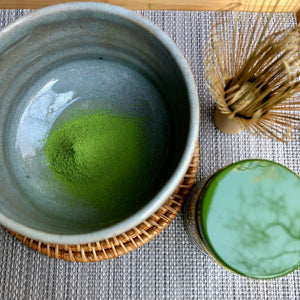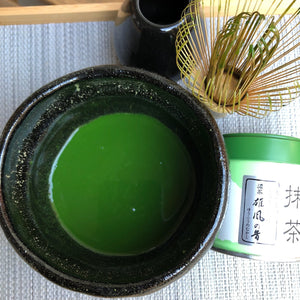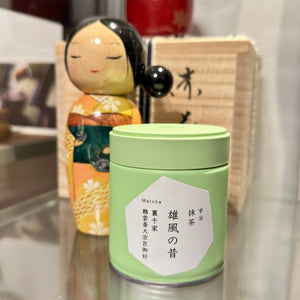
Matcha Yufu no Mukashi
Tax included
Shipping calculated at checkout
Out of stock
Pickup currently unavailable
Shichimeien - Yufu no Mukashi (Uji, Kyōto) • Ceremonial matcha
Yufu no Mukashi is made from carefully selected, first-harvest tencha from the historic Horii Shichimeien tea garden (Uji, Kyoto) and ground in a stone mill. Its color is vibrant emerald green, its texture is silky, and its flavor is deep umami , delicate sweetness, and a long, smooth finish.
Why is it lovable?
- Originating in Uji – the cradle of Japanese matcha; Shichimeien is one of the oldest tea producers/makers in the area.
- Ceremonial quality – a classic, balanced cup for usucha; also works well in koicha.
- Silky texture – fine grinding, easy foaming, clean sipping sensation.
Details
- Origin: Uji, Kyoto, Japan
- Raw material: first-harvest tencha, ground in a stone mill
- Quality: ceremonial
- Packaging: 30 g metal can
- Uses: usucha (thin tea); can also be made into koicha (thick tea)
- Quality preservation: general marking of Shichimeien matcha: ~6 months from production; can be stored well refrigerated/frozen (keep closed after opening)
Flavor profile
- Scent: fresh, green, slightly floral-nutty tones
- Taste: deep umami, subtle natural sweetness, no bitterness
- Texture: creamy, silky foam
- Finish: long, smooth, clean, soothing
Preparation (recommendations)
Pro tip: always sieve your matcha; cool the water to ~75–80 °C. Pre-warm the cup/chasen.
-
Usucha (thin tea, classic)
2 g matcha + 60–70 ml, 75–80 °C water. Whisk in a “W” motion for 15–20 seconds, until a fine, thick foam forms. -
Koicha (thick tea, more festive)
4 g matcha + 30–50 ml, 70–80 °C water. Do not foam, but slowly “knead” until creamy. -
Iced matcha shake (refreshing)
2 g matcha + 200–250 ml cold water + ice in a shaker; shake vigorously for 20–30 seconds. Silky, clean, refreshing.
Storage
After opening, close tightly and refrigerate. For longer storage, it can also be frozen; leave the box at room temperature before use to prevent condensation.
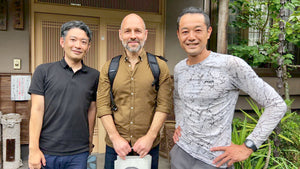
Personal contact
Our teas don't come from wholesale warehouses or unknown sources. We travel to the small producers we source from – whether it's a Japanese family tea garden, a Chinese mountain village or an oolong maker in Taiwan.
Stories
We meet them in person, learn their story, see how they care for their plants, and how they process the fresh leaves.
These experiences are the soul of our teas. This way, not only is the quality guaranteed, but also the fact that behind each cup there is a real person, a real story.
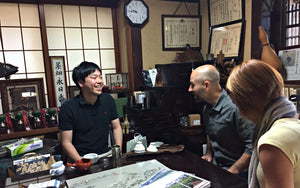
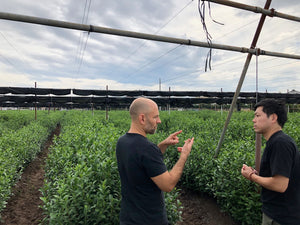
Direct
This direct relationship is valuable to us. Not only because of the excellent tea, but because we believe that trust, respect and personal presence are what make the tea drinking experience truly special.
Teavolution Tea Blog
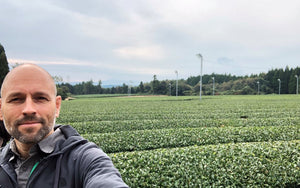
Oct 2, 2025
Sencha tea
Read more
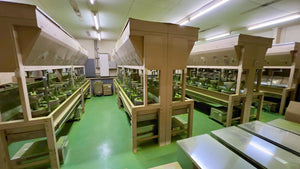
Sep 21, 2025
Matcha hiány Japánban
Read more
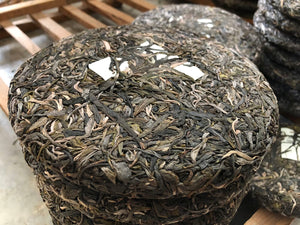
Mar 18, 2025
Puer tea, puerh or pu-erh
Read more
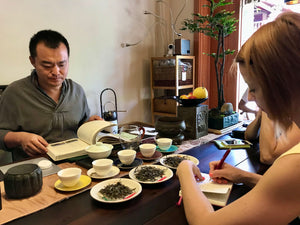
Mar 18, 2025
Types of tea
Read more
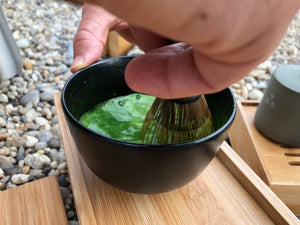
Mar 18, 2025
What is matcha tea?
Read more

Mar 18, 2025
Oolong tea (Wulong tea)
Read more

